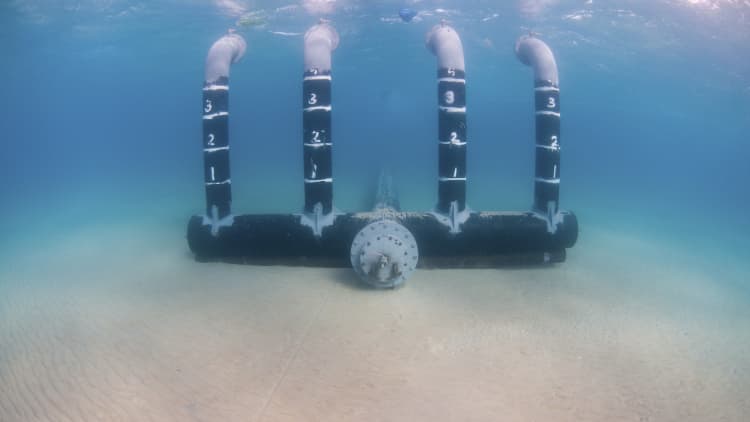Biden proposes first national limit on toxic ‘forever chemicals’

Environmental Protection Agency headquarters are seen in Washington, DC, U.S., January 19, 2020.
Lucy Nicholson | Reuters
Environmental Protection Agency on Tuesday proposed the first nationwide restrictions about the so-called “forever chemicals” in drinking water after it was discovered that the compounds were more dangerous than previously known — even at undetectable levels.
The chemicals, known as perfluoroalkyl agents, or PFAS, have been voluntarily removed by US manufacturers. But they are resistant to decomposition in the environment and can persist in the human body when consumed. As a result, most people in the United States have been exposed to PFAS and have the chemical in their blood, based on Centers for Disease Control and Prevention.
Since the 1940s, these chemicals have been used to make products waterproof, non-stick and stain-resistant, and can also be found in food packaging, cookware, and clothing. and firefighting foam, among other things. These chemicals have been linked to health problems including some cancers, liver damage and low birth weight babies.
The Environmental Working Group, an environmental organization, found 41,828 industrial parks and cities are known to produce, use, or are suspected of using PFAS, with some of the highest levels found in the cities of Miami, New Orleans, and Philadelphia.
The EPA’s proposed standards include six PFASs that have contaminated the national drinking water supply. The proposal would regulate PFOA and PFOS as individual contaminants and would regulate four other PFASs — PFNA, PFHxS, PFBS and GenX Chemicals — as a mixture.
For PFOA and PFOS, the agency has proposed a binding limit for drinking water of four parts per trillion each. And for the rest, the EPA proposed a hazard index-based binding limit designed to address the cumulative effects of the chemical.
The agency said it hopes to finalize the regulation by the end of the year. The EPA said that if fully implemented, the rule would prevent thousands of deaths and reduce tens of thousands of illnesses caused by PFAS.
“Communities across this country have suffered for far too long from the current threat of PFAS contamination,” EPA Administrator Michael Regan said in a statement. “The EPA’s proposal to establish a national standard for PFAS in drinking water is based on the best science available and will help provide states with the guidance they need to make decisions to protect best protect their community.”
The regulation will also require public water systems to monitor chemicals, notify the public, and reduce PFAS pollution if levels exceed proposed regulatory standards.
“Today’s proposal is a necessary and long-overdue step to address the nation’s PFAS crisis, but what happens next is just as important,” said Jonathan Kalmuss-Katz, attorney at Earthjustice. least”.
“EPA must resist efforts to undermine this proposal, rapidly finalize protective health limits for these six chemicals, and address the remaining PFAS that continue to poison the drinking water supply and cause harm. for communities across the country,” Kalmuss-Katz said.
The EPA was first alerted to the presence of PFAS in drinking water in 2001 but for many years has not set a nationwide regulatory limit. Last year, the agency released health advisories that set the health risk threshold for chemicals close to zero, replacing 2016 guidelines that set a higher threshold.
Representatives of U.S. chemical companies, such as the American Chemistry Council, objected to the Biden administration’s designation of PFAS chemicals as hazardous and argue that the rule is expensive and ineffective.
Last year’s agency also invited countries and territories filed for $1 billion under bipartisan infrastructure legislation to address PFAS in drinking water, especially in disadvantaged communities. The grant will provide technical support, water quality testing, contractor training and installation of centralized treatment technologies and systems.





